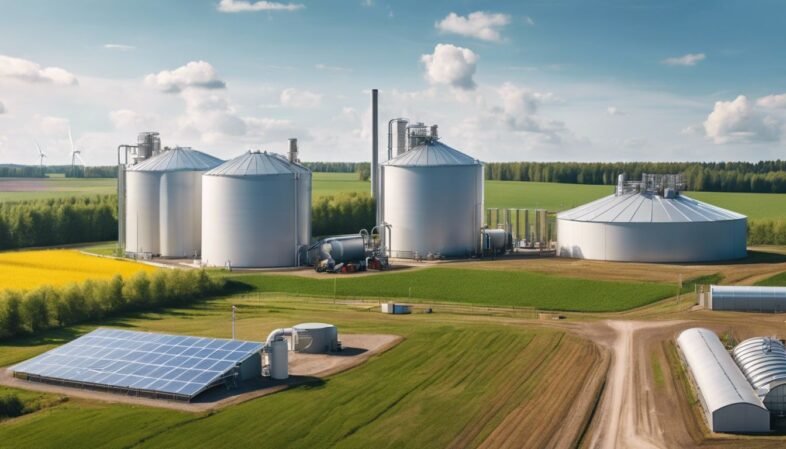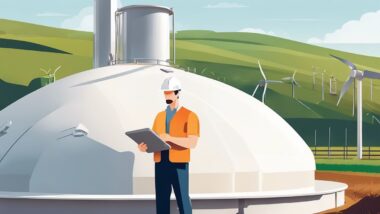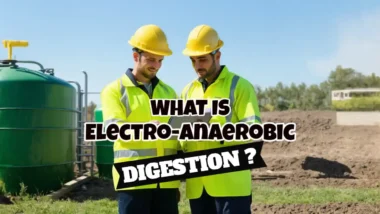Why write about anaerobic digestion In Lithuania? Many countries are wrestling with the challenge of finding sustainable energy sources and reducing waste. Lithuania, a country committed to eco-friendly solutions, is one of many countries looking at anaerobic digestion for biogas and biomethane production as a possible answer.
But what exactly is anaerobic digestion? And how does it tie into biomethane production in Lithuania? If you're concerned about climate change, renewable energy, or efficient waste management, these questions might be on your mind.
Anaerobic digestion breaks down organic materials like food waste without oxygen to produce biogas—a combination of methane and carbon dioxide. This process aligns perfectly with goals for clean electricity and alternative fuels in Lithuania. 2 In this blog post, you'll gain insights into the current state of anaerobic digestion in Lithuania, government efforts to promote it, and its potential growth in biomethane production. 1
Ready to explore more? Read on…
Key Takeaways for this Article: Anaerobic Digestion in Lithuania
- Lithuania is increasing its use of anaerobic digestion to process organic waste into biogas, thus reducing landfill waste and greenhouse gas emissions. Active facilities across the country significantly contribute towards renewable energy goals.
- Government policies and incentives, including operational support quotas and market investigations, are driving the growth of biomethane production. Collaborations with national bodies and corporate partners further aim to meet EU's ambitious emission reduction targets by 2050.
- The European Biogas Association works closely with Lithuanian governments to promote sustainable practices. This includes fostering circular bio-economy strategies that enhance competitiveness while supporting local job creation in rural economies through facility construction and operation.
- Biomethane plants convert agricultural waste into valuable clean fuel, supporting national energy independence by supplying gas for the electrification of transport and hydrogen production initiatives. This infrastructure helps reduce reliance on fossil fuels while stabilising supply to meet growing demand.
- By embracing anaerobic digestion technology, Lithuania not only advances environmentally friendly practices but also stimulates economic growth. Job creation extends from municipal solid waste pre-processing roles to farming previously unused lands for energy crops.
Overview of Anaerobic Digestion in Lithuania

Anaerobic digestion is growing in Lithuania. Many farms and industries turn organic waste into biogas using specialised facilities.
Current state and usage of Anaerobic Digestion in Lithuania
Lithuania is making strides in the field of anaerobic digestion. The usage of this technology has seen a rise, especially for producing biomethane. 2 Many facilities across the country now use biodegradable waste including food waste and organic agricultural waste to create renewable energy sources like methane gas and other gaseous fuels.
In 2023 alone, several new plants started operations, increasing the nation's capacity.
The European Biogas Association actively supports Lithuania's growth in this area. They work closely with local governments to promote sustainable practices and circular bio-economy strategies. 1 Policies focus on reducing greenhouse gas emissions while boosting competitiveness and networks. These initiatives have set Lithuania on course for significant advancements in renewable fuel production and environmental protection.
Government initiatives and policies
The government has initiated a biogas market investigation. This aims to boost the growth of biogas plants and promote renewable energy use in Lithuania. 3 They are also providing operational support for biomethane through quotas, covering anaerobic digestion and gasification.
An association works with national bodies, corporate partners, research members, and an advisory board in Lithuania. These collaborations push for sustainable practices within the bioeconomy.
The government's efforts help reduce reliance on fossil fuels while promoting local job creation.
Government policies aim to meet renewable energy targets by encouraging innovation in anaerobic digestion processes. This includes fostering partnerships between public institutions and private companies to advance research and development projects focused on thermochemical conversion technologies. 2
Biomethane Production in Lithuania
Lithuania produces biomethane from organic waste using anaerobic digestion. Many facilities convert this gas into a clean fuel, helping to reduce reliance on fossil fuels.
Production facilities and capacity
Several biomethane production facilities thrive across Lithuania, each with remarkable capacity. 4 These plants use anaerobic digestion to convert organic wastes into valuable biofuels.
Supported by the European Biogas Association, they form a robust network for producing and distributing biomethane. 4
Production facilities process vast amounts of waste daily, generating enough biogas to feed into the national gas grid. 2 This infrastructure ensures stable supply and meets growing market demand effectively.
Market demand and potential for growth
In Lithuania, biogas production is on the rise. The market for biomethane supports this growth trend. Biomethane production in Europe grows at a rate of about 15% yearly. 1 This shows strong potential for further development in Lithuania.
Government policies encourage investment in anaerobic digestion and biomethane projects. Facilities increase their capacity to meet rising demand. These initiatives help reduce reliance on natural gas imports, boosting local energy independence.
Thus, Lithuania is moving closer to its renewable energy targets by 2030, with an estimated 93% relying on anaerobic digestion. 4
Environmental researchers see clear benefits too—less greenhouse gas emissions and waste reduction play significant roles. Waste management professionals can tap into the circular economy model using digestate as fertiliser.
This creates new job opportunities and economic growth while supporting sustainable practices.
Environmental and Economic Benefits
Anaerobic digestion reduces landfill waste and utilises renewable resources. It also creates jobs, boosting the local economy while meeting energy targets.
Reduction of greenhouse gas emissions
Anaerobic digestion of manure cuts greenhouse gas emissions by a significant margin. This process transforms organic waste into biogas and nutrient-rich digestate, reducing methane released into the atmosphere. 6 Lithuania has embraced this technology to meet the EU goal of an 80%–95% GHG emission reduction by 2050. 5
AD plants also limit pollution and control odours from waste management facilities. They produce bioenergy which supports Lithuania's renewable energy targets. These plants play a crucial role in reducing reliance on fossil fuels, making energy supply cleaner and more sustainable…
leading to increased biomethane production in Lithuania.
Contribution to renewable energy targets
Lithuania's push into anaerobic digestion helps meet the EU’s renewable energy targets. The European Parliament aims for a 35% renewable energy mix by 2030. 5 Biogas plays a key role in this target, converting organic waste into energy and reducing reliance on fossil fuels.
In Lithuania, biogas facilities turn agricultural waste into valuable biomethane. This supports both electrification of transport and hydrogen production initiatives. 7 Expanding these efforts could make significant strides towards cutting greenhouse gas emissions by up to 95% by the year 2050.
Job creation and economic impact
Shifting from renewable energy targets, we see significant economic impacts from biomethane production. This sector boosts job creation in rural economies through the construction and operation of production facilities.
Increasing employment opportunities help these areas grow economically. 8
Municipal solid waste (organic fraction) pre-processing for biomethane also creates jobs in anaerobic digestion in Lithuania. Handling and transforming waste into valuable biogas requires a workforce. These new roles contribute to community prosperity across wide rural areas. 6
Deploying energy crops on abandoned land further stimulates job growth. Farming previously unused lands provides work for local residents, enhancing their quality of life while driving economic activity.
In future studies, experts predict even more employment as this sector expands.
A Conclusion to Anaerobic Digestion in Lithuania
Lithuania is harnessing anaerobic digestion to create biogas, turning waste into energy. The country has several facilities devoted to biomethane production, meeting rising market demand.
These efforts cut greenhouse gas emissions and contribute to renewable energy goals.
Government policies support this growth, ensuring a favourable environment for advancements. Developing these technologies offers job creation and boosts the economy. Could your community benefit from similar projects?
Explore the possibilities and join Lithuania in paving a path towards a sustainable future!
Anaerobic Digestion in Lithuania – FAQs
1. What is anaerobic digestion in Lithuania?
Anaerobic digestion in Lithuania is a process where organic waste breaks down without oxygen, producing biogas and, after the biogas has been purified and compressed, biomethane.
2. How does Lithuania use biogas from anaerobic digestion?
Lithuania uses biogas to generate energy, reduce landfill waste, and cut down on watercourse eutrophication.
3. Can power-to-gas technology be integrated with anaerobic digestion in Lithuania?
Yes, power-to-gas technology can convert surplus electricity into hydrogen gas which can then be combined with carbon dioxide from anaerobic digestion to produce more biomethane.
4. Are there any feasibility studies or simulations done for anaerobic digestion projects in Lithuania?
Feasibility studies and laboratory simulations are conducted by institutions like the Gdansk University of Technology to assess the viability of these projects.
5. What role do European countries play in supporting biomethane production via anaerobic digestion in Lithuania?
European countries provide funding and technical support for the development of anaerobic digestion in Lithuania through agencies like Fachagentur Nachwachsende Rohstoffe, helping improve gas distribution networks and ecosystems for better decision-making.
References
- ^ https://www.europeanbiogas.eu/wp-content/uploads/2020/12/GfC_MSTReport_2020_final.pdf
- ^ https://energy.ec.europa.eu/system/files/2023-09/Biomethane_fiche_LT_web.pdf
- ^ https://www.regatrace.eu/wp-content/uploads/2020/02/REGATRACE-D6.1.pdf
- ^ https://www.europeanbiogas.eu/wp-content/uploads/2022/07/GfC_national-biomethane-potentials_070722.pdf
- ^ https://www.sciencedirect.com/science/article/pii/S096014811830301X
- ^ https://www.europeanbiogas.eu/wp-content/uploads/2023/02/20230213_Guidehouse_EBA_Report.pdf (2023-02-13)
- ^ https://www.europeanbiogas.eu/wp-content/uploads/2024/04/Biogases-towards-2040-and-beyond_FINAL.pdf
- ^ https://gasforclimate2050.eu/wp-content/uploads/2020/03/Navigant-Gas-for-Climate-Job-creation-by-scaling-up-renewable-gas-in-Europe.pdf (2019-11-18)





